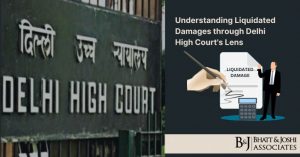Understanding the Implications: Wills and General Power of Attorney in Property Ownership
Introduction
The Indian Supreme Court, in a landmark judgement, addressed the critical aspects surrounding Wills and General Power of Attorney (GPA) in property ownership. The case in focus is Ghanshyam v Yogendra Rathi 2023. This article delves into the details of the judgement and the implications it carries for property transactions and disputes in India.

Background of the Case
The Dispute –
Mr. Ghanshyam (Appellant), who owned a property, entered into an Agreement to Sell on 10.04.2002 with Mr. Yogendra Rathi (Respondent) for the sale of the Suit Property. The Respondent provided the entire sale consideration, and on the same day, the Appellant made a will bequeathing the Suit Property to the Respondent. Additionally, the Appellant granted a General Power of Attorney to the Respondent. Although the Respondent took possession of the Suit Property, no sale deed was executed.
Initially, the Respondent allowed the Appellant to occupy a portion of the Suit Property as a licensee for three months. However, after the expiration of this period, the Appellant refused to vacate the Property. Consequently, the Respondent filed a lawsuit against the Appellant, seeking eviction from the Suit Property and recovery of mesne profits. The Respondent based his ownership claim on the Agreement to Sell, General Power of Attorney, possession memorandum, payment receipt of the sale consideration, and a will dated 10.04.2002.
The Appellant argued that the documents presented by the Respondent were manipulated on blank papers. However, no evidence was provided to support this claim. The Appellant did not dispute executing these documents or receiving the sale consideration.
The Legal Journey-
The Trial Court determined that there was no manipulation of the documents and ruled in favor of the Respondent, granting a decree for eviction and recovery of mesne profits. The Appellant then filed a first appeal and subsequently a second appeal before the High Court, both of which were decided in favor of the Respondent. Following these decisions, the Appellant filed an appeal before the Supreme Court.
Supreme Court’s Verdict
- Wills and Property Ownership
– Pre-existing Understanding: Traditionally, Wills have been seen as important documents concerning property succession.
– The Court’s Stand: The Supreme Court clarified that a Will comes into effect only after the death of the testator, and does not confer any right before that. Since a will has no force during the life of the executant, the Appellant’s will did not confer any right upon the Respondent.
2. General Power of Attorney and Property Ownership
– Traditional Practices: In the past, GPA was often used to circumvent registration fees and legal requirements.
– The Court’s Observation: The Court observed that GPA does not confer title and criticized the practice of recognizing GPA as a title document.
Statutory Requirements
The Court emphasized the importance of adhering to statutory laws, specifically referencing Section 54 of the Transfer of Property Act, 1882, which stipulates the necessary execution of a document for the transfer of property.
Impact on Property Transactions
– Clarity in Law: The judgement brings clarity in property transactions, ensuring that only properly executed and registered documents confer ownership.
– Curbing Malpractices: The ruling aims at curbing malpractices in property transactions which often involved the use of GPA as a means to avoid stamp duty and registration charges.
Conclusion
The Supreme Court’s ruling in Ghanshyam v Yogendra Rathi is a significant milestone in property laws in India. By establishing that Wills and GPA do not confer title or ownership rights in immovable property, the judgement brings much-needed clarity to property transactions and underlines the importance of statutory compliance.
Citations:
- Ghanshyam v Yogendra Rathi, 2023 – LiveLaw
- The Transfer of Property Act, 1882 – Section 54
- Transfer of Property Act 1882 – Indian Kanoon
- Supreme Court Judgements – Live Law









